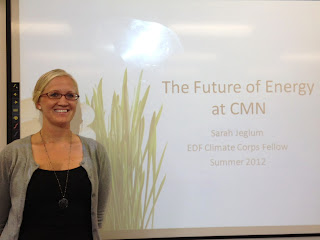On August 23, 2012, Environmental Defense Fund’s Climate
Corps Fellow Sarah Jeglum gave a presentation about “The Future of Energy on
the CMN Campus.” Twenty four attendees heard Sarah’s recommendations, discussed
future projects, shared ideas, and asked questions about her work over the
summer of 2012. Jeglum worked with the College of Menominee Nation to identify
energy efficiency projects and begin developing a long-term energy management
plan for the Keshena campus. The Environmental Defense Fund's Climate Corps
program places trained MBA and MPA fellows into companies, cities, and
universities to identify and analyze energy efficiency investments that can
both reduce costs and energy use in buildings.
SDI Interim Director Dean Fellman introduced Jeglum saying
she has served as a strong asset in the Sustainable Development Institute. Jeglum
gave an overview of the project and highlighted CMN’s commitment to be a climate-neutral
campus. Jeglum cited dedication for carbon neutrality and energy independence
in keeping with the more than 12,000-year-old tribal value of sustainability. “We
are looking how to move forward with energy goals from today,” said Jegulm, “It’s
important we have these far-reaching goals for the future.”
Jeglum stressed the importance of developing a plan and
getting a CMN energy team together. “It’s very important to have the structure
of the energy plan in place,” noted Jeglum. “I recommend you start with a team
and plan and move forward with that.” Jegulm said that CMN has the resources
available to do so and encouraged presentation attendees to be proactive about
the energy team.
There are many ways in which CMN can cut down its energy
use. Jeglum recommended monitoring successes or failures. “Set energy saving
goals” said Jeglum. She also stated that although CMN may be a small campus, it
is still important to focus on energy. “We can be successful even on a
small-scale,” she said.
Jegulm went on to point out specific projects CMN can
implement on campus to make the campus more efficient. Projects included
installing motion sensors, switching out old light fixtures, and more
energy-saving initiatives across all facets of campus energy. “No matter what
kind of energy it is, we want to be putting that in an efficient energy machine”
she stated. Jeglum continued to explain
that just as you wouldn’t put premium gasoline in an old vehicle, CMN needs to implement
specific action items by paying most attention to projects that will produce
resourceful results.
College of Menominee Nation is the first Tribal College to
host a Climate Corps Fellow. CMN President Verna Fowler noted that this energy
action illustrates our commitment to sustainability and commended Jeglum on her
work for Climate Corps and CMN.
Both Sarah Jeglum and Dr. Fowler expressed enthusiasm for
getting the information out and getting community members and students informed.
“It’s exciting for me to have it be a
campus where you can get students involved” said Jeglum. Dr. Fowler recommended
spreading the importance and benefits of energy saving out to the community,
perhaps in the form of workshops.
College of Menominee Nation thanks Sarah Jeglum and the Climate
Corps for the dedication over the summer of 2012. The Sustainable Development
Institute plans to use Jeglum’s information to assist in planning future goals
and directions.


No comments:
Post a Comment